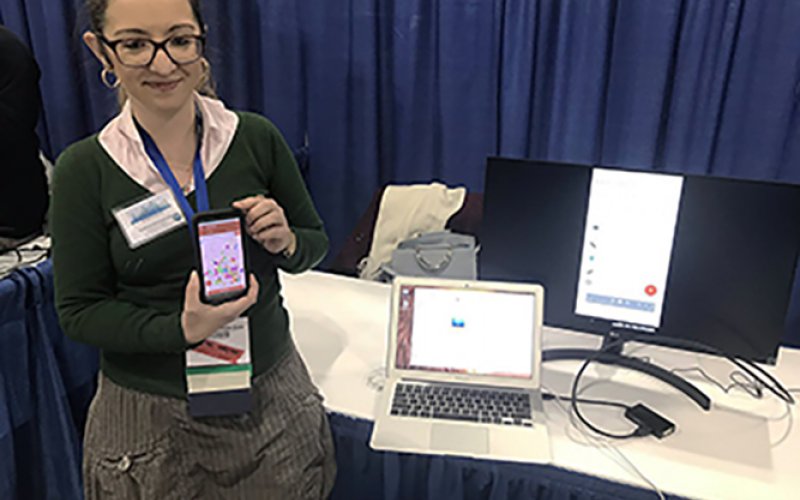Advancing the Human-Computer Revolution

Assistant Professor Daphney-Stavroula Zois is launching a project that will focus on wireless body area networks.
ALBANY, N.Y. (June 9, 2020) – From implantable cardioverter defibrillators to self-driving cars, the interaction of humans and computer systems continues to evolve at a frenzied pace. Now UAlbany Assistant Professor of Electrical and Computer Engineering Daphney-Stavroula Zois is launching a project in this field where we are just starting to understand its potential.
Zois, who heads the IMAgINE Lab at UAlbany’s College of Engineering and Applied Sciences, has received the prestigious Faculty Early Career Development (CAREER) award from the National Science Foundation to support her work on cyber-physical-human systems. The 5-year, $524,480 research grant supports junior faculty who exemplify excellence in teaching, research, and the integration of education and research to advance the mission of their organization.
Zois’ project, “Towards Optimized Operation of Cost-Constrained Complex Cyber-Physical-Human Systems,” seeks to expand our understanding of the operation of systems that integrate engineering with the natural world and humans to improve our daily activities.
“This award recognizes the quality of Dr. Zois’ work already at this early stage of her career, and will underpin her scholarship for years to come,” said CEAS Dean Kim L. Boyer. “Cyber-physical systems include everything from smart grids to robotic lawn mowers to personal, body-worn sensors. Dr. Zois’ research will lead to an improved quality of life for many by creating new modalities of interaction, particularly in health care and related decision support, with accurate, timely monitoring and, if necessary, health care provider notification. It is yet another example of the College’s mission of applying “Science in Service to Society.”
Complex-Cyber-Physical-Human Systems (CPHS) involve a series of interconnected systems (i.e., computers, physical devices, and people) communicating and interacting with one another over small or vast distances. Some examples include self-driving cars or home assistants. CPHS are also able to share information with other systems and data streams to improve functionality, perform maintenance or send an alert when a medical emergency is in progress.
For Zois, her project will focus on wireless body area networks (WBANs). These networks connect independent sensors that may be situated on clothing, on the body, or under the skin of an individual, and are used for various applications, including remote health monitoring.
“CPHS have the potential to adaptively optimize their operation towards continuous real-time monitoring of an individual's state, environment and related behaviors, while providing real-time recommendations,” said Zois.
Before we can unleash the potential of CPHS, Zois pointed out that there are unique challenges related to sensing, communication, computation and control that need to be jointly addressed in the presence of diverse data sets, resource constraints and humans-in-the-loop.
“This fundamental research will advance cyber-physical systems science by devising new mathematical tools and methods, and a theoretical framework that can be used as a building block for various CPHS applications for years to come,” said Zois.
As part of her work, Zois also plans to provide opportunities for underrepresented K-12 students in the City of Albany to explore STEM fields from the lens of CPHS by taking part in project-based school visits and hands-on workshops on simple sensor systems. She will also help prepare UAlbany students to become CPHS innovators by introducing CPHS concepts and activities in existing courses.
Zois’ award reflects NSF's statutory mission and has been deemed worthy of support through evaluation using the Foundation's intellectual merit and broader impacts review criteria. She is the sixth recipient of an NSF CAREER Award at the College.
Previous CAREER Award recipients include Professor of Electrical and Computer Engineering Won Namgoong (2002), Professor of Computer Science Siwei Lyu (2010), Associate Professor of Computer Science Jeong-Hyon Hwang (2012), and Assistant Professors of Computer Science Feng Chen (2018), and Mariya Zheleva (2019).
Namgoong, who serves as associate dean for research at CEAS, received his award for the study of high-performance ultra-wideband radio design.
Lyu’s CAREER Award to develop new methods to detect altered or faked digital images has led to additional funding through the National Science Foundation.
Hwang’s NSF CAREER award was used in the development of G*, a system capable of compressing dynamic graph data based on commonalities among the graphs in the series for “deduplicated” storage on multiple servers.
Chen’s project is entitled “SPARK: A Theoretical Framework for Discovering Complex Patterns in Big Attributed Networks.”
Zheleva was recognized for her work in burgeoning areas of wireless technology, “Automating the measurement and management of the radio spectrum for future spectrum-sharing applications.”




